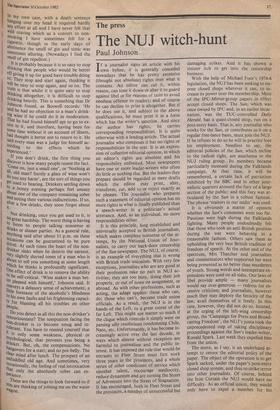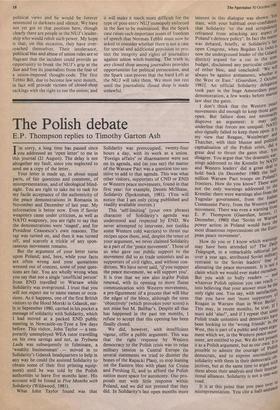The press
The NUJ witch-hunt
Paul Johnson
If a journalist signs an article with his own byline, it is generally conceded nowadays that he has pretty extensive (thought not absolute) rights over what it contains. An editor can cut it, within reason, can tone it down or alter it to guard against libel or for reasons of taste to avoid needless offence to readers; and of course he can decline to print it altogether. But if he does use it, and subject to the above qualifications, he must print it in a form which has the writer's sanction. And since the author has rights, he carries corresponding responsibilities. It is quite otherwise with a leading article. The actual journalist who composes it has no rights or responsibilities in the text. It is an expres- sion of collective editorial opinion, in which an editor's rights are absolute and his responsibility unlimited. Most newspapers have one or more leader-writers who often do little or nothing else. But the leaders they prepare should be regarded as mere drafts which the editor may print, alter, transform, cut, add to or reject exactly as he pleases. The journalist who prepares such a statement of editorial opinion has no more rights in what is finally published than a speech-writer in a politician's actual utterance. And, as an individual, no more responsibilities either. It is this principle, long established and universally accepted in British journalism, which makes complete nonsense of the at- tempt, by the National Union of Jour- nalists, to carry out back-door censorship of the Sun newspaper. The NUJ, of course, is an example of everything that is wrong with British trade unionism. With very few exceptions, journalists who are any good at their profession take no part in NUJ ac- tivities; they are too busy, doing their job properly, or out of town on assignment, or abroad. As with other professions, such as acting, the adage applies: those who can, do; those who can't, become trade union officials. As a result, the NUJ is in the hands of the Left, to a great extent of the far Left. This might not matter so much if the clique which controls it simply went on passing silly resolutions condemning Chile, Nato, etc. Unfortunately, it has become in- creasingly active over the last decade, in ways which almost without exception are harmful to journalism and the public in- terest. It has imposed the rule that would-be entrants to Fleet Street must first work three years in the provinces, and a whole series of other conditions of service which smother talent, encourage mediocrity, reduce dynamism and are turning the Street of Adventure into the Street of Stagnation. It has encouraged, both in Fleet Street and the provinces, a number of unsuccessful but
damaging strikes. And it has shown a sinister itch to get into the censorship business.
With the help of Michael Foot's 1974-6 legislation, the NUJ has been seeking to im- pose closed shops wherever it can, to in- crease its power over the membership. Most of the IPC-Mirror-group papers in effect accept closed shops. The Sun, which was once owned by IPC and, in an earlier incar- nation, was the TUC-controlled Daily Herald, has a quasi-closed shop, run on a post-entry basis. That is, any journalist who works for the Sun, or contributes to it on a regular free-lance basis, must join the NUJ. If he refuses to do so he will in practice lose his employment. Needless to say, the editorial policies of the Sun, which incline to the radical right, are anathema to the NUJ ruling group., Its members became particularly incensed during the Falklands campaign. At that time, it will be remembered, a certain lack of patriotism exhibited by the BBC and in other jour- nalistic quarters aroused the fury of a large section of the public; and this fury was ar- ticulated by the Sun in a robust fashion. The phrase 'traitors in our midst' was used.
It is obviously a matter of opinion whether the Sun's comments went too far. Passions were high during the Falklands fighting. Many people undoubtedly felt that those who took an anti-British position during the war were behaving in a treasonable fashion. Others saw them as upholding the very best British tradition of freedom of speech. At the other end of the spectrum, Mrs Thatcher and journalists and commentators who supported her were being presented as no better than murderers of youth. Strong words and intemperate ex- pressions were used on all sides. Our laws of libel provide ample — many journalists would say over-generous — redress for ex- cessive criticism; and journalists, however much they may deplore the ferocity of the law, avail themselves of it freely. In this case, however, they did not do so. Instead, at the urging of the left-wing censorship group, the 'Campaign for Press and Broad- casting Freedom', the NUJ's junta took the unprecedented step of taking disciplinary proceedings against the Sun's leader-writer, Ronald Spark. Last week they expelled him from the union.
The move, as I say, is an underhand at- tempt to censor the editorial policy of the paper. The object of the operation is to get Spark sacked, under the paper's post-entry closed shop system, and thus to strike terror into other journalists. Of course, behind the Iron Curtain the NUJ would have no difficulty. As an official union, they would only have to expel a member for his political views and he would be forever sentenced to darkness and silence. We have not yet got to that position here, though clearly there are people in the NUJ's leader- ship who would relish such power. My hope is that, on this occasion, they have over- reached themselves. Their intolerance, political bias and abuse of union rules are so flagrant that the incident could provide an opportunity to break the NW's grip at the Sun and free its journalists from the fear of a union-imposed thought-code. The first Tebbit Bill, due to become law next month, in fact will provide victims of closed-shop sackings with the right to sue the union; and
it will make it much more difficult for the type of post-entry NUJ monopoly enforced in the Sun to be maintained. But the Spark case raises such important issues of freedom of speech that Norman Tebbit must now be asked to consider whether there is not a case for special and additional provision to pro- tect the integrity and rights of journalists against union witch-hunting. The truth is, any closed shop among journalists provides opportunities for political persecution, and the Spark case proves that the hard Left at the NUJ will take them. We must not rest until the journalistic closed shop is made unlawful.











































 Previous page
Previous page